|

Scholars-in-residence
program
Presentations are free; kosher meals moderately priced
● Rabbi
Yakov Horowitz, founder, Project Y.E.S. (Youth Enrichment Services)
for
Agudath Israel, Jan. 4-5
● Rabbi Ari
Kahn, director, Foreign Student Programs,
Bar Ilan University, Israel, Feb.
22-23
Call us for details at (619)
287-9890, Reserve Shabbaton meals before January 2
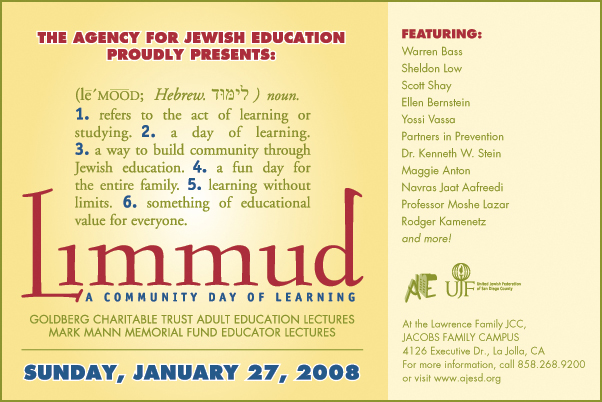

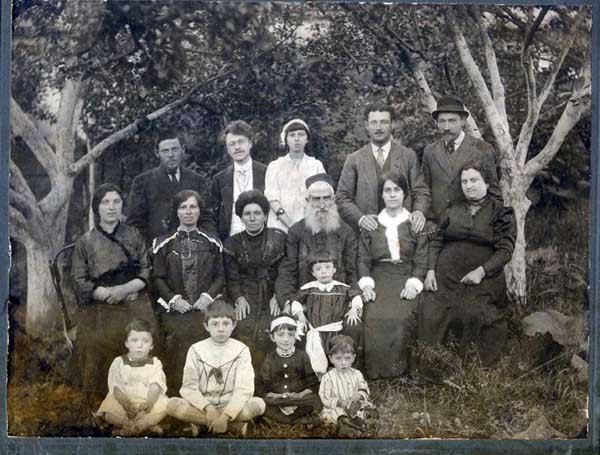
JEWISH MEMORIES
Baron Rothschild came visiting near Kiev
By Sheila Orysiek
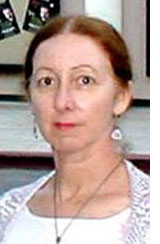 SAN DIEGO -- I wish I had listened more closely to the family remembrances my maternal grandmother related. However, since I was only eight when she died, it’s understandable that a child of that age doesn’t listen closely or takes for granted that the memory of the elders will always be available. The child lives in a world in which it is immortal, and so assumes the adults are too. SAN DIEGO -- I wish I had listened more closely to the family remembrances my maternal grandmother related. However, since I was only eight when she died, it’s understandable that a child of that age doesn’t listen closely or takes for granted that the memory of the elders will always be available. The child lives in a world in which it is immortal, and so assumes the adults are too.
My maternal grandfather’s parents lived in the vicinity of the city of Kiev and were wealthy landowners. The land they owned included forests which supplied the trees for the lumber mills they also owned. But wealth was only part of how they lived; family members were also very observant Orthodox Jews. Their success gave the men in the family the leisure to spend their days studying the Torah.
Sheila Orysiek
My maternal grandmother’s parents’ affluence came from the wholesale and retail yardage shops they owned. At least one of my great uncles traveled as far as Argentina on trips to purchase goods for the business. However, the women ran the day to day minutia of the various businesses, the home, the servants, while the men studied. The marriage between my grandmother and grandfather was arranged between two families of equal economic, religious and social strata. They were only permitted to meet - rigorously chaperoned - the evening before the wedding.
One particular family memory my grandmother related is most intriguing. The Baron Von Rothschild was planning to travel through the Russian Empire (in the mid 1800’s as far as I can determine) and as an Orthodox Jew he needed to stay at places where he could have kosher - and adequate - accommodations. Since such places were not readily obvious, he wrote to the Chief Rabbi of Russia and asked for suggestions. My great grandfather’s home in the Ukraine was the choice of both the Chief Rabbi and the Baron as not only being sufficiently Orthodox but also of a size to accommodate the Baron and his entourage. Therefore he wrote to my great grandfather and requested permission to stay as he traveled in the area.
Of course, my great grandfather wrote back and welcomed him asking the Baron what special things he might like and/or need. The Baron answered saying the family was not to trouble itself, he would bring everything he needed except fresh food. Indeed, the Baron’s arrival was heralded by a long line of wagons carrying his bed, his linens, his other necessities and his retinue of servants. All this was added to an already large household staff of servants the family employed. The house was big enough to hold it all.
The visit was most successful and in thanks the Baron had his chef prepare a huge banquet to which everyone in the vicinity of the estate was invited. Tables covered with white linen tablecloths were spread out under the trees in the gardens. Dessert was served on lacey filigreed plates which turned out to be made of edible spun sugar. Everyone was delighted.
I have a picture of the family that was taken on the estate amidst the trees. As I look at it I can see how beautifully everyone is dressed - their faces and body language look relaxed. My aunt and uncle (my mother’s sister and brother) are young, my mother not yet born. She was the youngest and never knew the opulence of the life the family lived. She never knew her father. She was born in 1918 and within six months of her birth her father had been slaughtered, the beautiful house burned and the family on the run.
Being Jews they were at the mercy of whatever group - red army - white army - or just thugs - happened to be in the area. One particular group suggested to the Jewish men that they all congregate in the town square to receive arms and training to defend themselves. My grandfather went. My great uncle did not. He begged my grandfather not to go - he smelled a trap. Indeed, all the Jewish men who came to the town square that day were beheaded. The uncle hid in the town toilet pits and survived and lived to save the rest of the family.
The beautiful house - newly enlarged - was burned over my grandmother’s head as she ran out of it carrying my infant mother and some family silver she managed to grab. This was the start of four years of horror - of hiding, running, several near death escapes until in the middle of one night they paddled on a raft across a river into Romania where they spent the next six years waiting to meet the quota for immigration to the United States.
When my mother was still only a few months old, as part of a group of hunted Jews, she and my grandmother were hiding in the hayloft of a barn. In the scramble to hide the baby’s (my mother) head struck a beam. The group held its breath expecting the baby to cry which would have instantly given them all away. By some miracle, she didn’t cry. However, my grandmother realized that hiding with so young a child might in the future not be so fortunate - the entire group of people was at risk. What to do?
My grandmother took her child to the local priest. She told him of her situation and asked for his help. They made a deal. She would give him her infant daughter for safety and if she didn’t return he could raise the child as a Christian. However, if she did come back she wanted his word that he would return the child to her. Of course, all the power was in his hands, only his personal sense of honor was in her favor. He took my infant mother, put his chain with its cross around her neck and when the soldiers came to take the baby, he protected her. Being an honorable and righteous man, he returned the baby to my grandmother when she was able to reclaim her.
The final crossing into Romania was a near thing. My mother, by now age four, remembered the bullets shot at them as they escaped across a field, crawled under barbed wire and down to the river out of the Ukraine. They spent the final night hiding in a well. Of the several groups of refugees waiting to flee across the river - only one group was chosen. The “captain” who chose which group would go had fallen for my grandmother - a most beautiful woman. He chose her group.
The uncle who hid in the toilet pits had gotten himself to the United States and immediately began bringing over the eldest child of each family unit. He brought my mother’s much older sister (the young woman in the back row in white) - she was sixteen - to America and spent the six years her mother and sister were waiting for the quota, working and saving for their passage as well as sending them money upon which to live in Romania as resident aliens. She saved enough to bring them over on the beautiful White Star Liner “Majestic” in second class, not steerage.
They all ended up eventually - the entire family except for my murdered grandfather - in a little house in an immigrant neighborhood in Philadelphia. Of course the wealth was long gone, but the reputation lingered. I saw and experienced echoes of it.
When the Chief Rabbi of Philadelphia heard that my grandmother was now in the city and a widow - he proposed marriage (through an official matchmaker). My grandmother considered it. However, she didn’t feel it in her heart to marry him and even though such a marriage would have made life much easier for her - she refused and married someone else.
I also remember other Jewish families in the neighborhood coming to visit her - literally pay court to her. She would sit calmly - regally - in a chair and the visitor would respectfully approach to greet her - almost bowing in front of her. It was an extraordinary thing for an American child to watch. While I played with my little friends, their grandparents would point me out as “Shandel Robbins’ granddaughter.” I had no idea what this meant - but I did know that somehow it meant something. The elders around me were awed - I felt it, but didn’t understand it.
Another “echo” which as a child I really enjoyed was my grandmother’s wonderful talent of baking elegant things - she had learned it from her family’s chef. She also knew the fine points of crocheting lace and made lovely things. She had learned it from the lace maker employed by the family. She could read, write and speak a number of languages, (Hebrew, Yiddish, Russian, Polish, Romanian) including English so she could become a proud American citizen - I have her naturalization document.
The adults around me often reminisced about those long gone days and the life they had lived. For the men in the family who escaped to the United States, though they couldn’t bring over their wealth, they did bring with them their enterprising talents and all of them became successful and wealthy - some hugely so. The women were less fortunate. They came from a milieu in which female enterprise was not expected. Though thoroughly educated, they were raised to be mothers, wives - adornments to the family rather than active world outside the home.
When the women sat and talked about what had been lost, their faces grew sad. For the younger ones such as my mother - she had never experienced the world “before” and so didn’t mourn its loss - at least not the monetary part of it. She did, however, mourn all her life the father she never knew - both his lost presence in her life and the terrible manner of his murder. I, too, mourn that loss. As strange as it may seem, his death affected me - the grandfather whose genes I carry, but never got to meet. Events do affect us down through the generations - as the Torah says.




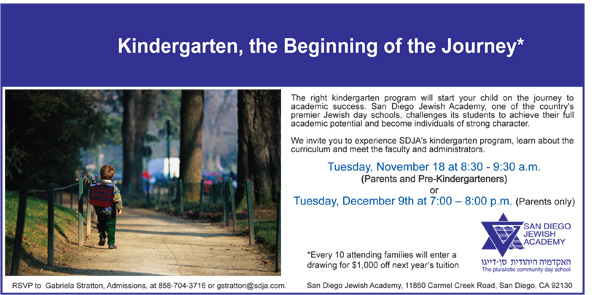

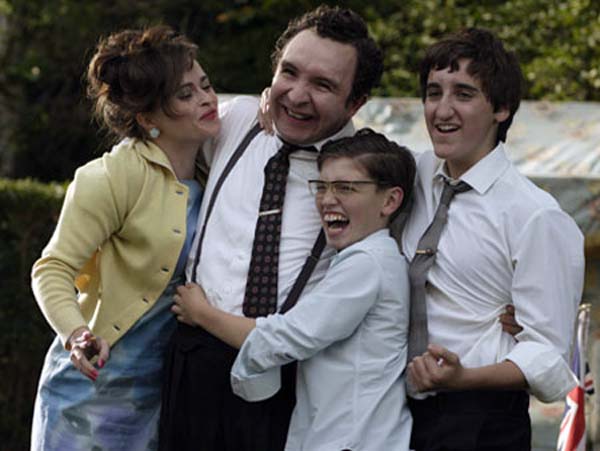
THE JEWISH CITIZEN
'Mostly truish' comedy recalls bar mitzvah
By Donald H. Harrison
 SAN DIEGO—There is a saying that troubles that don’t kill you will make you stronger, and, if so, the character Bernie Rubens (Gregg Sulkin) in Sixty Six will become a super-man after his bar mitzvah. SAN DIEGO—There is a saying that troubles that don’t kill you will make you stronger, and, if so, the character Bernie Rubens (Gregg Sulkin) in Sixty Six will become a super-man after his bar mitzvah.
 The “mostly truish” story by director Paul Weiland, set during the incredible 1966 soccer season in which underdog Great Britain won the World Cup in a final over West Germany, will be the opening night presentation, at 7 p.m. The “mostly truish” story by director Paul Weiland, set during the incredible 1966 soccer season in which underdog Great Britain won the World Cup in a final over West Germany, will be the opening night presentation, at 7 p.m.
Donald H. Harrison
Thursday, Feb. 7, of the 18th Annual San Diego Jewish Film Festival at the AMC La Jolla. The 93-minute British comedy will screen again at 7:30 p.m., Sunday, Feb. 10, at the UltraStar Mission Valley.
Bernie is the kind of kid who gets picked last by his classmates for soccer, who is bossed around by his older brother Alvie (Ben Newton) and who tends to get overlooked wherever he goes. So, for him, his upcoming bar mitzvah is less about accepting the responsibilities of Jewish adulthood and more about finally getting to bask in the spotlight.
But there are problems. When his older brother was having his bar mitzvah, the small grocery store owned by his father Manny (Eddie Marsan) was doing well. But in the interim, a supermarket came into the neighborhood, taking half his customers and persuading his father and uncle (Peter Serafinowicz) to sell their business at a loss.
More tsuris comes in the form of a house fire, following which Bernie’s father suffers deep depression and loss of self-confidence, notwithstanding the obvious love and care lavished on him by his wife, Esther (Helena Bonham Carter).
None of these problems compare in Bernie’s mind with the fact that the championship match of the World Cup will be held in Britain on the very same day his bar mitzvah reception is scheduled. All would be well if England could be eliminated from the match, but the home country heroes refuse to be shunted aside. Bernie even tries voodoo dolls to stop their march to victory—as he knows everyone will be glued to the television set, or attending the match, rather than joining him at the bar mitzvah.
The troubles were milked perhaps a bit too long, but in the end viewers will be smiling over the resolution of Bernie’s troubles. One jarring note came when Bernie’s learned, bearded, blind and Orthodox rabbi referred to Hebrew Scriptures as “the Old Testament”—Christian usage that seemed completely out of place.
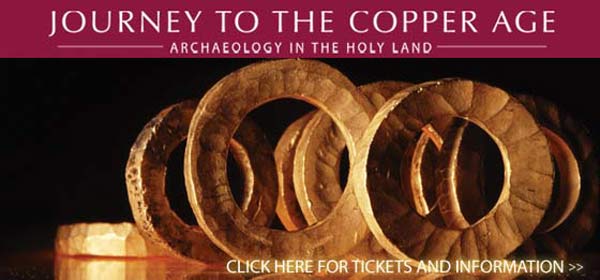

DOING IT BETTER
Jewish connections at retirement home
By Natasha Josefowitz, Ph.D.
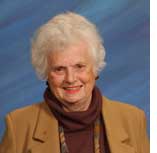 LA JOLLA—I have a strange tale to tell. LA JOLLA—I have a strange tale to tell.
Just as the St. Paul’s Senior Homes & Services, a Full Service Retirement Community, is not affiliated with Catholicism and the Seacrest Villages Retirement Communities have a younger population than its predecessor Hebrew Home for the Aged, White Sands is not a home solely for retired Presbyterians anymore. The effort at White Sands is to become more interfaith (“non-denominational” means Christians only, but of different denominations—while “interfaith” includes all faiths.)
Natasha Josefowitz
So with the eighth day of Chanukah upon us, my husband Herman and I decided to include the whole community into our menorah-lighting ceremony.
We put up a couple of announcements and over seventy people showed up. Herman spoke about Chanukah not competing with Christmas: One is the birth of a religion, the other celebrates a military victory of significance. Twenty-three hundred years ago, after three years of fighting, the Maccabees were able to drive the Syrians out of Israel and reclaim the Temple in Jerusalem. The miracle that is being celebrated is that a tiny jug of oil, enough to last one day, burned for eight days in the Temple. So to honor that victory, Jews light a candle every day for eight days.
Following this tradition, we lit the candles, reciting the blessings in Hebrew and in translation and thanked everyone for coming to share in this tradition and in our heritage.
The strange tale is what unfolded afterwards.
We had invited a few residents who are either Jewish or are in a mixed marriage to stay for dinner. What happened next is that a number of people came forth and said they had a Jewish grandmother or grandfather, a Jewish son or daughter-in-law, a Jewish grandchild. One family had a daughter who was divorced from a Jewish husband, another had a Jewish niece that had converted. All these people started talking about their connections to Judaism—no matter how removed. We ended up with twenty people in our small, private dining room and could have included ten more had there been room.
The morning after, more people came out of the woodwork, talking about name changes due to wars and more Jewish relatives. The list was growing.
What was happening? It was roots on one hand, and it was something else—permission to reveal a Jewish connection which at one time, not so long ago, might not have been as acceptable. In the Germany of the 30s and early 40s this could have been a death sentence. But now, in an atmosphere of acceptance and even celebration, people allowed themselves to speak of those Jewish relatives.
According to Scott LaFee, San Diego Union-Tribune (December 13, 2007), kin selection is the evolutionary mechanism that increases the odds that shared genes will be transmitted to future generations, and as human populations have expanded, kin selection has grown from immediate family, to clan, to tribe, to more distant blood relations and to marriage-acquired relatives.
Reflecting on the evening, it is wondrous indeed how lighting the menorah candles permitted a different kind of light to shine, for some of shared heritages, for others of inclusiveness. Long ago in Jerusalem, a small amount of oil expanded to last for eight days; this year in La Jolla, a small gesture expanded to make many people kin
And so Chanukah, Christmas and Kwanzaa have ended, and I wish everyone a year of good health, happiness, peace and shared celebrations throughout

SAN DIEGO JEWISH WORLD THE WEEK IN REVIEW
Eitan Frysh in San Diego: Frum Jewish director stays out of theatres on Shabbat, chooses only tasteful plays
Peter Garas in Canberra: 25,000 salmon free for the taking has his mouth just watering for fresh bagels
Donald H. Harrison in San Diego: Movie probes after-effects of the Holocaust: Dear Mr. Waldman will screen twice at San Diego Jewish Film Festival
Gabi Maio in San Diego: Teen recounts she was chosen for summer leadership trip to Israel
Dov Burt Levy in Salem, Massachusetts: Readers share opinions on whether we should teach children about the Shoah
Ira Sharkansky in Jerusalem: What about Israeli-on-Israeli violence?
Dorothea Shefer-Vanson in Mevasseret Zion, Israel: A glorious chorus brought in New Year
Tuesday, January 1, 2008 (v2, no. 1)
Peter Garas in Canberra, Australia: Forget the tail of the dog that bit you; now it's the breeze from the air that you heated
Donald H. Harrison in Escondido, California: Dinner and a movie: two fine inter-cultural opportunities
J. Zel Lurie in Delray Beach, Florida: Har Homa once again the monkey wrench in the Middle East peace process
Lynne Thrope in San Diego: Fine restaurants to offer special prix fixe menus during San Diego's 'restaurant week'
MONDAY, DECEMBER 31
Shoshana Bryen in Washington, D.C.: Turkey and U.S. join to fight Kurdish terror
Donald H. Harrison in Los Angeles: Animals stand in for people at Skirball's imaginative, interactive Noah's Ark exhibit
Sheila Orysiek in San Diego: I am resolving to be more resolute
SUNDAY, DECEMBER 30
Shoshana Bryen in Washington, D.C.: Bhutto assassination proves that turmoil in Muslim world is not about the Jews
Rabbi Baruch Lederman in San Diego: The spouse who is waiting just for you
Rabbi Leonard Rosenthal in San Diego: Any Jew can grow up to be a leader of our people
Ira Sharkansky in Jerusalem: Palestinians' violence threatens the establishment of their state, not Israel
FRIDAY, DECEMBER 28
in Simi Valley, California: Nostalgia: Key ingredient at Reagan library
Dorothea Shefer-Vanson in Mevasseret Zion, Israel: Elementary students demonstrate their new-found knowledge of the Torah
< BACK TO TOP
|

